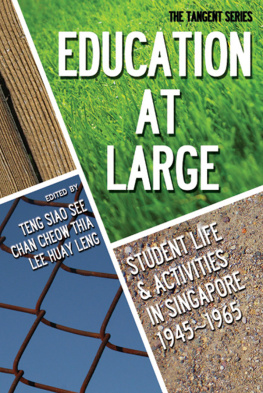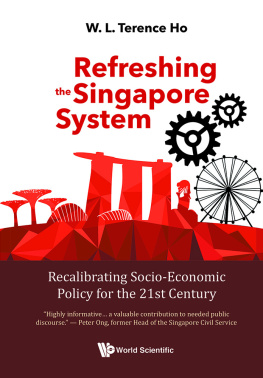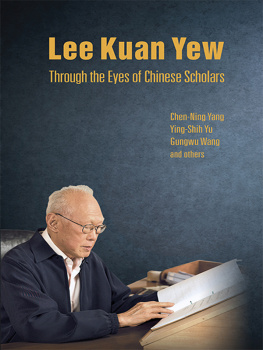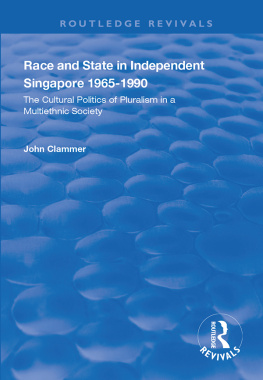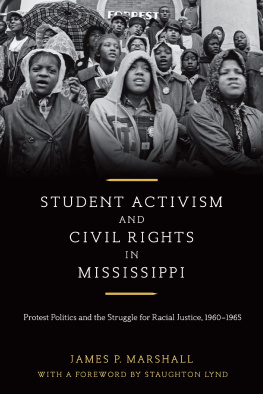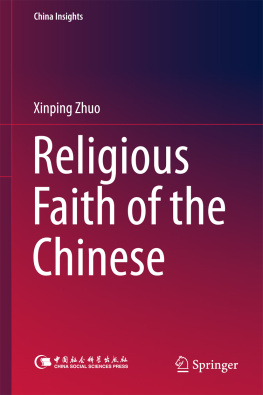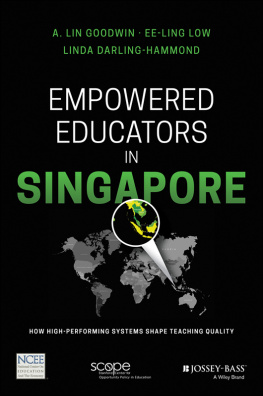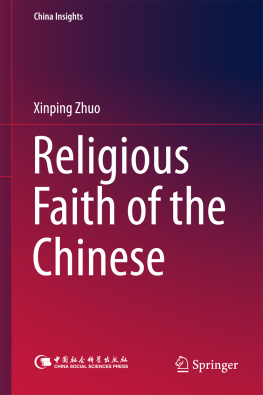EDUCATION
AT LARGE
STUDENT LIFE & ACTIVITIES IN SINGAPORE
1945 - 1965
EDUCATION
AT LARGE
STUDENT LIFE & ACTIVITIES IN SINGAPORE
1945 - 1965
Editors
Teng Siao See
Chan Cheow Thia
Lee Huay Leng

Published by
The Tangent
38 Springleaf Rise
Singapore 788018
and
World Scientific Publishing Co. Pte. Ltd.
5 Toh Tuck Link, Singapore 596224
USA office: 27 Warren Street, Suite 401-402, Hackensack, NJ 07601
UK office: 57 Shelton Street, Covent Garden, London WC2H 9HE
Library of Congress Cataloging-in-Publication Data
880-01 Xiao yao you. English.
Education-at-large : student life and activities in Singapore, 1945-1965 / [edited by] Teng Siao See, Chan Cheow Thia and Lee Huay Leng.
p. cm.
ISBN 978-9814405546 -- ISBN 981440554X
1. High school students--Singapore--History--20th century. I. Teng, Siao See, 1975
II. Zeng, Zhaocheng. III. Li, Huiling, 1971 IV. Title. V. Title: Student life and activities in Singapore, 19451965
LA1239.5.X5313 2012
373.18095957-dc23
2012017573
British Library Cataloguing-in-Publication Data
A catalogue record for this book is available from the British Library.
Cover Designer: Mark Yong
Copyright 2013 by The Tangent and World Scientific Publishing Co. Pte. Ltd.
All rights reserved. This book, or parts thereof, may not be reproduced in any form or by any means, electronic or mechanical, including photocopying, recording or any information storage and retrieval system now known or to be invented, without written permission from the Publisher.
For photocopying of material in this volume, please pay a copying fee through the Copyright Clearance Center, Inc., 222 Rosewood Drive, Danvers, MA 01923, USA. In this case permission to photocopy is not required from the publisher.
In-house Editor: Lum Pui Yee
Typeset by Stallion Press
Email:
Printed in Singapore
Still youthful
dedicated to those who left behind
imprints of a bygone era.

| The Exhibition Featured as well as the
Publication of this Book is Sponsored by the
Chinese Language and Culture Fund. |
CONTENTS
Lee Huay Leng
Translated by Chan Cheow Thia
Transcribed by Gan Woan Wen
Translated by Tan Hui Yi and Swee Hui Weng
Nur Nasuha
Hsin Shu Han
Transcribed by Chan Cheow Thia
Translated by Chiu Wei Li
Tan Pin Pin
Huang Jianli
Transcribed and translated by Chan Cheow Pong
Kwok Kian Woon
Transcribed by Chan Cheow Pong
Translated by Low Yen Yen
Zhong Hongzhi
Translated by Ng How Wee
Interviewed by Chiu Wei Li, Zhou Zhaocheng and Lee Huay Leng
Transcribed and Compiled by Lee Huay Leng
Translated by Chiu Wei Li and Chan Cheow Thia
Interviewed by Lee Huay Leng
Transcribed by Wang Peijie
Translated by Chiu Wei Li and Francis Lim Khek Gee
Interviewed by Zhong Hongzhi and Lee Huay Leng
Transcribed by Zhong Hongzhi
Translated by Low Yen Yen
Interviewed by Chan Cheow Thia and Teng Siao See
Transcribed by Lee Hui Jun, Ding Lee Yong and Chan Cheow Thia
Translated by Teng Siao See
Interviewed by Chan Cheow Thia, Teng Siao See
Transcribed by Ku Ka Tsai, Lim Woan Fei, Chan Cheow Thia
Translated by Ho Sheo Be
Interviewed by Chan Cheow Thia
Transcribed by Chan Cheow Thia, Chan Cheow Pong
Translated by Lim Meow Nar
Lim Chin Joo
Translated by Melissa Gay
Transcribed by Lynn Ong
Chan Cheow Thia
FOREWORD
THOSE UNFORGETTABLE EXPERIENCES OF YOUTH
Lee Huay Leng
Translated by Chan Cheow Thia
Ever since its founding, The Tangent has always welcomed different opinions within the group. Members are divided with regard to the issue of the society keeping to a small-scale operation, or expanding to take on different forms of public engagement. Some have thought that the group should demonstrate greater social commitment and do more to promote the use of Chinese language in discussing current affairs and other issues concerning long-term national development. There are also others who feel that it is reasonable to maintain small-scale activities given our resource constraints. Looking back, the decision to do something different and yet continuative of our spirit was made under amicable circumstances.
The approach can be perceived as continuative because it was not the first time history was selected as the theme of a project. In 2002, the Tangent had organised a forum entitled (Un)learning the Past and subsequently published Voices of History, a special bilingual issue of our journal in 2003. However, the new task we set for ourselves was no longer merely organising forums or closed door discussions, but sustaining a whole series of activities that would culminate in the exhibition Education-at-Large: Student Life and Activities in Singapore 19451965. These activities included a public forum, during which we invited Mr Han Tan Juan and Professor Koh Tai Ann, educated in Chinese and English school traditions respectively, to share personal memories of their school lives; a conscious and concerted collaboration with schools, with educator researcher, Mr Lim Cheng Tju, invited to give a special talk to participating students on research methodology and the historical background of the period 19451965; as well as an appeal to members of the public to donate artefacts and share their stories, during which members of the Tangent also acquired new knowledge in the process of gathering oral histories.
Most members of the Tangent belong to the generation born in the years between 1960 and 1980. Impressions of the 1950s and 1960s, or even the 1970s a period not too distant are almost zilch apart from the mainstream discourse of the state-led relentless pursuit of economic survival and growth. If we have retained some memories, they are faint. For several decades, the entire society has focused on solving problems of food and housing, and we grew up amidst a national mindset that has emphasised the nurture of culture and the arts only after fulfiling our visceral needs. Moreover, our island-state is one of the few places in the world where the founding fathers have occupied the political stage for an extensive period of time. An attempt to approach the 1950s and 1960s would thus involve interpreting the origins of current political power. For many years, the governing authorities abstained from accounting for a past still too close for comfort, whereas the people maintained their silence on the same shared historical experience. When we went to schools, the local textbooks on Singapore history usually offered expositions only up to the end of the Pacific War. What we can remember most vividly after the books have been set aside may probably be the gallant figure of Raffles, his arms wrapped in front of his chest.
Such impoverished memories led us to think and ask more questions about our past. They made us even more curious about the times closest to our childhood. A retrospective survey will tell us that this island-state has experienced tremendous changes over the past 15 years, but the monograph that has been profoundly influential and claims to offer a complete account of Singapores past is perhaps an autobiography published in two parts in 1998 and 2000: The Singapore Story: Memoirs of Lee Kuan Yew and From Third World to First: The Singapore Story 19652000. For the writing of the two books, massive resources were mobilised to conduct a systematic organisation and recording of issues ranging from in-dividual and public participation to significant national matters. Narrating in an authoritative tone, the author presents what he cast as truths about the past. This gesture attracted considerable attention both within and beyond our island-state. Regardless of whether people agreed or disagreed with the contents of the memoirs, historical events and viewpoints became the foci of public discussion and contestation. Even though there have been more narrators, however when narrating remembrances, people still create for themselves categories of what can be said or otherwise. In general, more people started talking about how our island-state became sovereign; about the players in the process and the roles they played; and how the process has impacted on the subsequent development of Singapore, and etc. The more new materials surfaced, the more it became apparent that we cared and knew too little before this.
Next page
